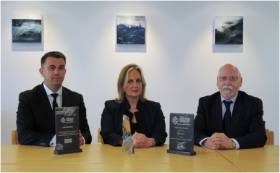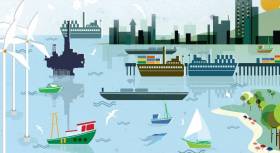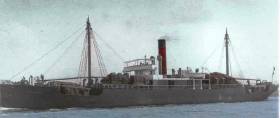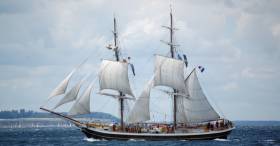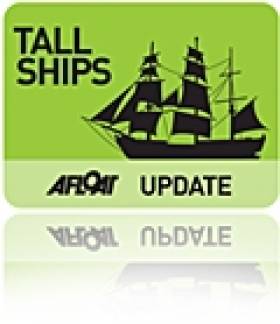Displaying items by tag: maritime
Maritime Culture At This Year’s Cork Harbour Festival
Get ready for a carnival of maritime culture at this year’s Cork Harbour Festival, 4th-12th of June. Now in its second year, the festival presents a fresh perspective on everything the Harbour has to offer through a programme of over 50 unique and fun-filled events.
The festival begins with the Ocean to City – An Rás Mór on Saturday June 4th. This year marks the 12th edition of this iconic race, which sees over 150 hardy crews take to the water for the gruelling 28km route from Roche’s Point to Cork’s city centre. As a premier event in Irish and international rowing, the Ocean to City attracts crews from all over Europe. The race features over 30 different types of craft, from traditional Irish currachs, to Chinese dragon boats and stand-up paddle boards! Spectators can soak up the colour and festivities in many places along the race route, including Cobh, Monkstown, Passage West and Blackrock. Follow the race route by bike with the Harbour Pedal, bring a picnic to Passage, or enjoy thrilling acrobatics from Funky Fidelma and street performers at the finish line. Mingle with the many crews and treat yourself to a range of foodie delights at the festival market.
Cork Harbour Open Day on June 5th offers kayaking, surfing and coasteering tasters in East Cork, family adventure in Spike Island, crab fishing fun in Cobh, and historical re-enactments at Camden Fort Meagher. Turn a weekend stroll into a bird watching walk, get behind the scenes of the Irish Navy with a naval ship tour, or discover the work of ocean energy researchers at the MaREI Centre, Ringaskiddy.
Festival week continues to push the boat out, with event highlights including:
· Rocket Man’s Paddling Pantry: Jack Crotty a.k.a. The Rocket Man mixes his love of good food and fresh flavours with a kayaking adventure. Circumnavigate the city channels and enjoy Cork’s built heritage while being treated to a tasty lunch!
· River Runner and Green Drinks: The Opera House plays host to this moving documentary portrait of the River Lee from source to sea. The film uncovers the secrets of its oldest inhabitant, the Wild Atlantic Salmon, and the river’s unique forest delta, known locally as the Gearagh. The film is followed by Cork Environmental Forum’s ‘Green Drinks’, a chance to meet and chat with local and national environmental organisations.
· Morgenster Tall Ship: Visit the Dutch sail training ship ‘Morgenster’ during her stay in the city. The Morgenster will be docked in Cork on June 11th and Cobh June 12th.
· Lunchtime Lectures: The festival teams up with UCC’s History Department to bring an engaging series of mid-day lectures at St. Peter’s Church. Learn about the history of the Bordeaux wine trade with Ireland, the Hapsburg’s visit to Ireland in 1518, and the story of the Royal Navy during the 1916 Rising.
· Festival Cruise: Enjoy a summer’s evening cruise through Cork Harbour before mooring up for a tasty meal in Crosshaven
· Boats and Bites: The festival’s midweek celebration of boats and the freshest bites will include a seafood market and free taster sessions aboard a currach, dragon boat, powerboat and more!
· Night-time Kayak: A unique opportunity to paddle the city by night and explore Cork from a whole new angle.
· SUPing in the City: Dip your toes in with kayaking and Stand-Up Paddle Boarding taster sessions at the Lee Fields in Cork City.
Cork Harbour Festival aims to bridge the distance from city to sea through a programme that encourages people to discover the region. Festival Director Donagh MacArtain says, “The festival highlights the importance of the River Lee and Cork Harbour as a natural and cultural resource, and celebrates the communities and organisations at the heart of it. This year’s programme has something for everyone, whether you like to get active and get outdoors, are a regular or first time ‘boatie’, want fresh ways to enjoy some fun with the family, or want to soak up the harbour’s history and folklore.’’
Cork Harbour Festival is organised by Meitheal Mara, the community boatyard, training centre and charity located in the heart of Cork City. The Festival is sponsored by Cork City Council, Cork County Council, Port of Cork, Failte Ireland and MaREI, and made possible with the help of dozens of Event Partners and hundreds of volunteers.
National Maritime College of Ireland Recognised for Consistency in Academic Excellence
At the 2016 Irish Logistics and Transport Award ceremony, the National Maritime College of Ireland (NMCI) were, for the third year in succession, recognised for their excellence in educational programmes, and were awarded the prestigious Education award for their Bachelor of Business degree in Supply Chain Management. This annual gala event in Dublin, attended by over five hundred delegate representatives from the supply chain and logistics management sector, gathered to celebrate the best of what their industry has to offer. Jane O’Keeffe, course director of Supply Chain, proudly collected the award on behalf of the NMCI.
NMCI is a constituent college of Cork Institute of Technology (CIT) and focuses on both maritime and non-maritime industry sectors, and offers customised education and training programmes to meet individual requirements. The Bachelor of Business in Supply Chain Management degree programme is designed to support industry requirements, and for those with experience in logistics and supply chain management, who wish to further their career prospects.
This unique programme, in its ninth year, builds upon the students’ experiential knowledge and provides grounding in a wide and diverse range of disciplines. To date graduates have experienced excellent employment and career progression opportunities in both indigenous and multi-national organisations. The programme has been so successful within the logistics and supply chain industry nationally, that it is proposed to incorporate modules in logistics and supply chain into the bachelor degrees in Nautical Science, Marine Engineering and Marine Electro-technology at the NMCI. This is in keeping with the current best practice throughout the Maritime colleges in Europe and globally. Currently the Supply Chain degree programme is being developed as Level 8 offering through the CAO system.
The Government Future Skills Needs publication in 2015 highlighted Freight Transport, Distribution and Logistics (FTDL) sector in Ireland as a significant growth area for the period 2015-2020, and programmes such as those on offer at the NMCI are currently seen to address the opportunities highlighted at middle management level within the sector. A review of the skills gap in Ireland concurred with international best practice in identifying common skills development and talent attraction issues. The NMCI is appropriately positioned to support logistics and supply chain education and job creation, as in excess of 90% of global trade by volume is transported by sea. This is an indication of the importance of logistics to the maritime industry and of even greater importance to Ireland where 98% of trade by volume comes through its seaports. The NMCI facility, which embraces advanced technologies including simulation in its programmes, is ready to meet the growing demand in best in class logistics and supply chain education and training.
Ireland's Maritime Spatial Planning Consultation Underway
Maritime spatial planning for Ireland takes a step closer this year thanks to an EU directive first adopted in 2014. The directive obliges all coastal Member States to establish maritime spatial plans by 2021. Member States, including Ireland, must transpose the Directive into national law by 18th September 2016. The Goverment is seeking submissions but the deadline is less than a month away.
Maritime Spatial Planning (MSP) is a new way of looking at how we use the marine area and planning how best to use it into the future. Marine industry activists have long argued the lack of ability to licence the oceans that surround us has been the biggest obstable to developing the 'blue economy' for Ireland.
MSP will try to balance the different demands for using the sea including the need to protect the marine environment. It's about planning when and where human activities take place at sea. It’s about ensuring these activities are as efficient and sustainable as possible. Maritime spatial planning involves stakeholders in a transparent way in the planning of maritime activities.
The Department of the Environment, Community and Local Government has drafted regulations intended for Irish law and it is inviting submissions on the draft regulations. To assist the Dept has prepared a guidance document showing the relationship between the articles of the Directive and the regulations. More details here
The closing date for submissions is 5.30pm on Friday, 6 May 2016
Draft regulations are attached below
Meanwhile, the sixth conference of the MSP stakeholder series, focusing on MSP Worldwide has been postponed. The conference is now confirmed to be held on 23 - 24 June 2016 at the University of the Azores, Ponta Delgada, Azores.
According to the organisers, the conference will present experiences, opportunities and challenges of MSP implementation around the world. In particular it will look at how MSP can advance Blue Growth world-wide, its potential to promote climate change solutions, as well as at the role of area-based management regimes in international waters. The main purpose is to take stock of what is being done at international level and identify potential synergies as well as possible contributions from European MSP processes.
An Island Nation – But Not Yet A Maritime One!
I love Irish history. It is the story of the Irish people, living in an island nation. But I have always wondered about a maritime, a shipping aspect of the Easter Rising, the commemoration of which has raised the profile of our evolution as an independent country. And that is – would it actually have been possible for the AUD, the German ship with weapons and ammunition for the Irish Volunteers, by arrangement with Roger Casement, to have landed its cargo in Tralee Bay, which is the accepted historical conception of that part of the plans for the Rising.
I have always wondered about the challenge and difficulties of getting 20,000 rifles, 10 machine guns and 3.5 million rounds of ammunition off that ship in the conditions and shipping facilities of Tralee Bay and the probably only realistic landing site at Fenit in 1916.
Was it to have been done at Fenit? In the facilities there for unloading in 1916 would that actually have been possible? Was it thought that the cargo might be got off into open boats in the Bay?
I got my opportunity to ask that question of an expert on the period last weekend, Dr. John Treacy, who was recently awarded his Ph.D. from Mary Immaculate College in Limerick for his doctoral thesis about the Naval Service.
He answered me very directly: “I would say absolutely not.”
He had a lot more to say about the AUD and the plan for it to provide weaponry for the Volunteers when I interviewed him at a seminar which underlined the huge public interest in Irish maritime affairs. “Revolution on an Island -The Maritime Aspects of the 1916 Rebellion,” was organised by the Irish Maritime Forum. It was booked out. People attended from all over the country. There was even a waiting list for places at the National Maritime College in Ringaskiddy on the edge of Cork Harbour where it was held.
Dr. Treacy spoke on ‘The Silent Shore – The Attempt to land arms at Banna Strand from the AUD.” It is a fascinating part of Irish history and the maritime involvement. If you have any interest at all in our history, I urge you to listen to him below on my programme, THIS ISLAND NATION.
It was also an unusual experience for me at that seminar to find myself being quoted at the outset. It was for my description of Ireland as an “island nation” which is accepted by the Forum, which is an independent think-tank on maritime matters. But the Forum had a qualification – “Ireland is not yet a maritime nation”
You can hear more about this from retired Naval officer, Capt. James Robinson, who discusses it with me on behalf of the Forum. Not a lot has been heard about the Forum in public, but this seminar was a revelation.
Simon McGibney, the new Commodore of the Irish Cruiser Racing Association, talks to me about his plans for this year’s sailing and the retirement of one of the country’s longest-serving lifeboatmen, from the RNLI Rosslare Station, is reported while there is also good advice on the programme about using vehicles to launch and recover boats from slipways in view of the Buncrana tragedy.
THIS ISLAND NATION reports on the marine traditions, culture, history and modern maritime developments of our island nation. I hope you enjoy it and would welcome your comments. You can Email to: [email protected]
Ireland is an island nation but not yet a maritime nation. So said Capt. James Robinson of the Irish Maritime Forum and formerly of the Irish Naval Service when opening the Forum's conference at the National Maritime College in Ringaskiddy, Cork Harbour, this morning. Attendance at the one-day conference 'Maritime Aspects of the 1916 Rebellion' has been fully booked-out. It is examining the influence of sea power on the rebellion, including the Aud and the Helga. People are attending from all over the country.
Tall Ship Sailing Chance Between Irish & Scottish Ports
Anyone aged between 16 and 28 who would like to sail aboard a Tall Ship is being offered the opportunity by Belfast City Council and Sail Training Ireland. As Afloat.ie previously reported, The Tall Ships, “Maybe” and “Morgenster” are the vessels on which voyages between Belfast, Scottish and Irish ports, will be available, as part of Belfast’s Maritime Festival. Applications are invited with a deadline of Friday, March 25.
Strong Speaker Line–Up for Irish Maritime History Conference At UCC
Following the success of last year’s inaugural maritime conference at UCC, the School of History is to hold the second annual Irish Maritime History Conference next weekend, October 16/17, exploring Ireland’s rich sea-going past and culture. Topics will include piracy, naval warfare, smuggling, fishing communities, shipwrecks, boat building and World War One on the Irish Sea.
There is a strong line-up of speakers from around the country and overseas, making for what should be a most interesting event.
Sessions will be from 1-3 pm on Friday, October 16, another from 3-7 pm and a full day on Saturday from 9-6 pm. Admission is free and no registration is required. Based on last year,.
The Tall Ships Are Coming to Drogheda
#tallships – The countdown to The Irish Maritime Festival is well and truly on. The ships have set sail from their respective home ports and are fast approaching Drogheda for the Festival from 19-21st June.
In association with Maxol, The Irish Maritime Festival is one of the largest festivals in the North East and attracts visitors from Dublin, Belfast and all across the country. Situated in the historic port of Drogheda, the event is staged by Louth County Council and Drogheda Port Company.
The ships will arrive in a parade of sail up the River Boyne on Friday 19th June beginning at 1.30pm and everyone is welcome to be there. "It is such a wonderful sight to see these magnificent vessels sailing up the river. We invite and encourage everyone to be there. The parade of sail and opening event on Friday is free to attend and children and families are particularly welcome." explained Festival Organiser Mary T. Daly of Louth County Council
This family friendly festival features a huge range of off and on shore activities. The off-shore schedule includes over 250 swimmers competing in the challenging Boyne Swim, a 2.7km long swim finishing in front of cheering audiences. Check out the fleet of vintage lifeboats courtesy of the RNLI and learn about their adventures at sea. Board the beautiful classic ships or marvel at the 100ft long Class A Tall Ship "The Morgenster", so tall that it won't even fit under Drogheda's iconic viaduct. Watch out for the Boyne Regatta and the Howth to Drogheda yacht race.
Seasonal favourites such as the Pirate Battles and Extreme Sports displays will also return to the River Boyne as part of the 2015 Irish Maritime Festival.
Another new challenge this year is the heroic "Battle Across the Boyne" Tug of War taking place on Sunday at noon at the DeLacy Bridge. Teams from the near side and the far side will compete for glory.
On-shore there is lots to do and see. "The Irish Maritime Festival truly allows the local community here in Drogheda and the Boyne Valley to shine" Mary T. Daly continued. "The Festival is made up of so many brilliant community groups and businesses who bring so much to the Festival and are helping to grow it into a truly national event. There will be sand castle competitions, adults and kids cookery demos, maritime themed walking tours, artisan food producers, skills displays by the Scouts and much more. Two live music stages will be going all weekend with singer songwriters and bands from all over the North East. Chill out in the pop up cinema and catch up on some maritime themed family movies. Visit the aquarium. Meet the whale and dolphin experts and see their life sized models. Take part in the art competition in the Art and Photography zone. Compete for the chance to be crowned the East Coast Chowder Champion. And there's more, much more to see and do."
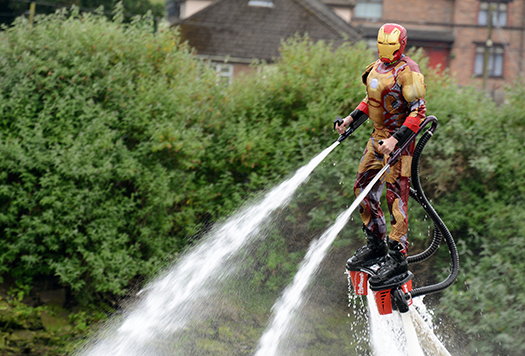
See the Iron Man in Drogheda
Car lovers won't want to miss the 5th Annual Drogheda Motor Show also taking place at The Irish Maritime Festival. Shiny new cars with beautiful interiors and great sales promotions are the order of the day at the Motor Show. Watch out for the "Design a Car" challenge. This competition is a collaboration between local primary schools, local motor dealers and the team at Drogheda Men's Sheds and the results promise to be some pretty innovative car designs.
It's not too late to volunteer to be part of the Festival. Mary continued "We are expecting 40,000+ visitors to the Festival over the weekend so we are delighted to have such a brilliant team of volunteers on board. Become part of the Festival Volunteer team by visiting www.maritimefestival.ie/volunteer, complete your details and one of the volunteer co-ordinators will be in touch."
Tickets for all this family fun are surprisingly affordable at just €5.00 for 1 adult and up to 2 children or €10 for a family ticket of 2 adults and up to 4 children. Tickets are available at the gate or avail of a 20% saving when you book online at www.MaritimeFestival.ie.
"The long range weather forecast is good and the ships are on their way. We've lots of fun, family friendly activities planned for everyone and we can't wait to welcome you all. Ahoy there – see you at the Irish Maritime Festival!" concluded Mary T. Daly.
Ireland's Maritime Economy Outperforming Other Sectors
#blueeconomy – Ireland's blue economy is performing on average better than the general economy according to the 3rd Report on Ireland's Ocean Economy, soon to be published by the Socio-Economic Marine Research Unit (SEMRU) based at NUI Galway. Latest indicators show that Ireland's maritime economy grew by 9% in the period 2010 to 2012, while growth in Irish GDP during the same period was only 4.75%. In the period 2012 to 2014, the blue economy has continued to outperform the national economy with growth rates of 8% and employment has also increased from 17,425 to 18,480 full time equivalents.
The value of Ireland's maritime economy, the commercial opportunity it presents and its contribution to the Irish economy will be discussed at a major marine industry conference, Our Ocean Wealth, which takes place on 10th July 2015 in Ringaskiddy, Cork.
Speaking at the launch of the Our Ocean Wealth conference in Haulbowline, Minister for Agriculture, Food, the Marine and Defence Simon Coveney, T.D. said, "Ireland's blue growth shows the enormous potential of our incredible marine resources, and the opportunity, highlighted in the government's Integrated Marine Plan 'Harnessing Our Ocean Wealth', to enable this sector to be a key driver in our economic recovery, providing social and cultural benefits as well as economic return for Ireland".
Industry experts from Ireland, the EU and USA will convene on the site of the new €15 million Beaufort building for the event on Friday, 10 July and the event is expected to attract in excess of 600 delegates.
EU Commissioner for Environment, Maritime Affairs and Fisheries Karmenu Vella will lead discussion on management and governance of our oceans, enhancing Europe's maritime competitiveness, whilst continuing to protect the environment.
The Organisation for Economic Co-operation and Development (the OECD) will be represented by Barrie Stevens, Head of International Futures Programme and he will deliver a keynote address on the Future of the Marine Economy.
There will be a number of speakers from indigenous companies and organisations with an interest in the marine, including Chairman of Port of Cork John Mullins, as well Yvonne Shields, Chief Executive at the Commissioners of Irish Lights. As well as panel discussion and interactive workshops on a variety of topics from Integrated Marine Capacity and Capability, Energy from the Ocean and Enterprise and Industry to Tourism and Business in Marine and Coastal areas and Food from the Sea, there will also be an industry exhibition of startups, university spin-outs and established companies led by the SFI-Funded marine research centre, Marine Renewable Energy Ireland (MaREI).
The Our Ocean Wealth conference is an integral part of Ireland's Maritime Festival, SeaFest 2015, celebrating Ireland's abundant maritime resources over 2 days in Cork Harbour.
#rathlin – The Rathlin Sound Maritime Festival was celebrating its most successful run in the Festival's history, until high winds affected the crossings on the Rathlin Sound, according to Causeway Coast and Glens Tourism Officer, Caroline Carey.
It was estimated that this year's Festival opened to a record number of visitors and tourists to Ballycastle, with thousands of tourist enquiries leading up to and including the first weekend.
Caroline Carey, Tourism Officer at Causeway Coast and Glens explains, "It was just unfortunate that there were high winds on the Sunday 31 May which stopped many people going to Rathlin and enjoying the many planned festivities.
"Despite that, his year we were over the moon with the amount of interest in our local area. Figures are yet to be finalised, but we were confident that the Rathlin Sound Maritime Festival would have drawn in nearly 10,000 people to the area."
"We've had some amazing events on in both Rathlin and Ballycastle, which have really brought both of our communities together. It all kicked off on Friday with the Blessing of the Boats, which was absolutely beautiful. After the serene ceremony, Saturday saw a host of maritime events, with our very own jet man, power boating and kayaking, followed by some fabulous cookery demonstrations and art and craft events on Sunday at the Ballycastle Market.
"Our stand-out events include the fabulous Frances Black concert at the Marine Hotel on Sunday 24th, which was a resounding success, it was a real treat to have Frances performing. Frances's daughter, Aoife Scott also performed, and both were delighted to be back in the area and really enjoyed their time here! On Wednesday 27th, Trevor Robertson, the world renowned record breaking sailor also stopped by Rathlin Island, delivering a talk on his times spent 'overwintering' and inviting the locals to come on board his famous 'Iron Bark'.
"Despite the bad weather, the events on Sunday were very successful, it's just such a shame that some people couldn't make it over for them! The Festival celebrated our passion for the sea, local culture, heritage and history, and we finished with Rathlin's 'Big Lunch', music from 'Runabay' and our 'Living Seas' event on Sunday 31st May."
Sponsored by Tourism Northern Ireland, Malin Waters, Fair Head Tidal and Rathlin Island Boat House, the festival is renowned for its musical events, celebration of local produce and, of course, the many varied maritime activities.
Michael Cecil, Chair of Rathlin Community and Development Group explained: "inclement weather reduced the numbers somewhat but even that was a reminder that we are all very closely connected to nature. Seeing so many traditional boats , meeting so many like minded people from all over this earth and hearing so much traditional music over ten days was something very special."
"We would like to say a huge thank you to all who have come out and supported the Festival and ensured that this year was a huge success up until the Sunday. This was a team effort, and it wouldn't have been possible without the help from our sponsors and the Council Harbour & Tourism Section, Ballycastle Community Development Group, the Rathlin Development & Community Association, and the Ballycastle Chamber of Commerce and Industry," concluded Caroline Carey.




























